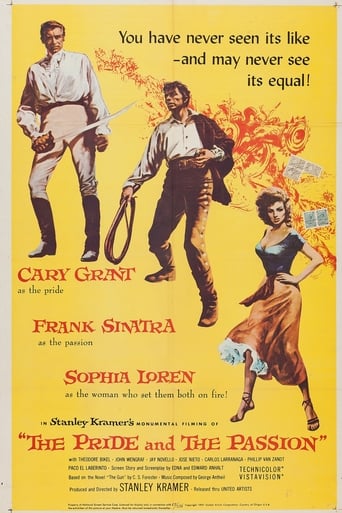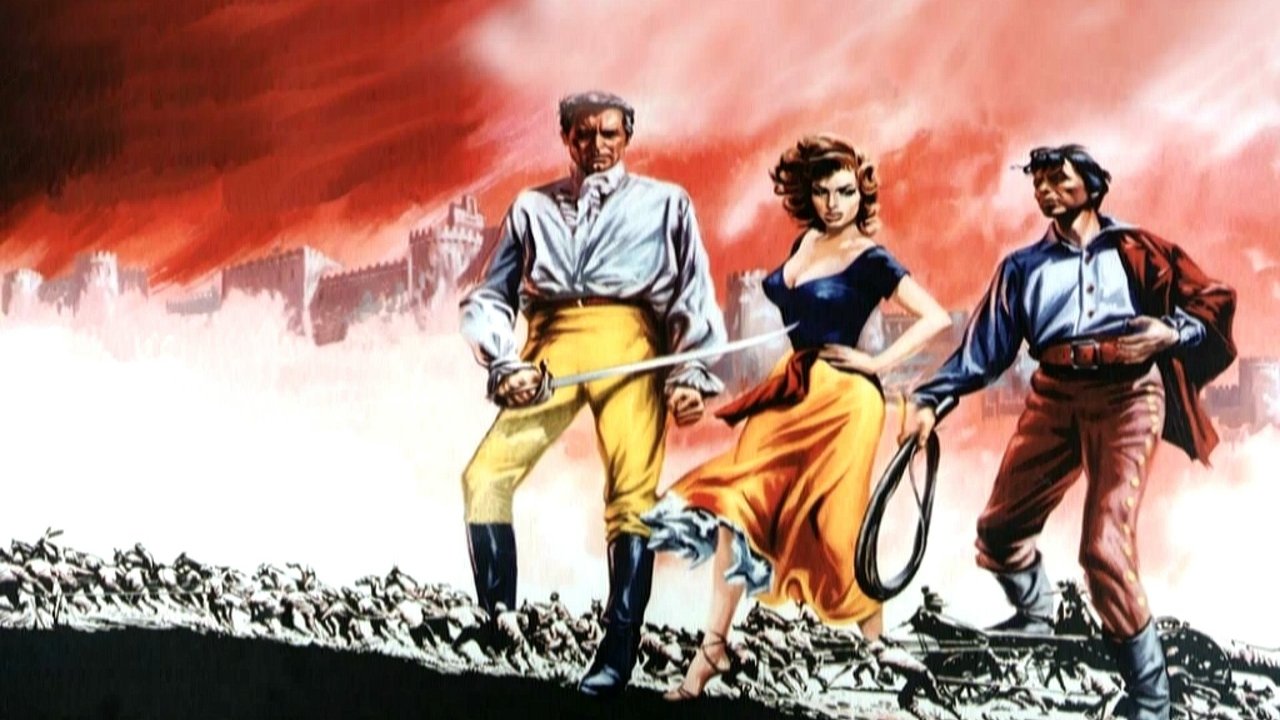darbski
***SPOILERS*** This'll be brief. The ONLY reason to watch this bomb is delectable Sophia. I saw it when I was twelve years old, she was hotter than any stupid old cannon that anybody wanted. I didn't understand why they didn't bump off Mr. Grant along with Mr. Sinatra; they were expendable, anyway. But Sophia? Gimmie a break, Hollywood. The lack of conscience in such an oversight is impossible to fathom, even now. A gross miscarriage of hotness. I give Sophia a 10+, and the movie a 7 - only because of her.
theowinthrop
Anyone acquainted with many of my reviews notices my background as a history major. Frequently I lament the fact that in pursuit of movie making that will turn into box office gold the studios (especially American ones) will ignore historical events or places. This is true about Ancient Greek History (pace the two films about Themopylae, and the two films about Alexander the Great - where is a decent films about Pericles?). It is also true about 18th-19th Century Spanish history. In particular, Napoleon's first major military goof: his invasion of the Iberian Peninsular in 1808 (four years before his better remembered goof, his invasion of Russia). "War And Peace" is such a classic novel that it has been made and remade as film and television series several times, so we know what happened in Russia pretty well. But the events in what Napoleon's "chancre sore" in Spain and Portugal are barely noted. I recall the Jeannette MacDonald - Allan Jones operetta film "The Firefly". There is a degree of involvement in the plot of "Anthony Adverse"(toward the end). Later there was that film with Tony Franciosa about Goya at the royal court, which dealt a little bit with the inept Count Godoy. But the actual events of the rise and fall of French involvement in the Peninsula are never mentioned. Not even (as far as I know - please tell me if I'm wrong) a movie about Sir John Moore (Wellington's model as a commander) and his death in the retreat from Corunna (it would have been a great film for British morale after Dunkirk).I don't know how "The Pride And The Passion" got started as a project. It is based on a minor novel of C. S. Forester, and that can be the reason. Forester struck Hollywood gold twice, first with his short novel "The African Queen" (about events in British and German colonies in Africa in 1914), and then with "Captain Horatio Hornblower", the film with Gregory Peck about the adventures of Forester's fictional British Captain in the Napoleonic Wars. I suspect since Peck and his film did well in the movie houses, it was thought a land based Forester tale would do just as well. So they chose this idiocy.The plot deals with Anglo-Spanish cooperation in moving a heavy siege gun to a fortified town in order to breach the walls. The officer sent in command is played by Cary Grant. If his attempt to do American Revolutionary History, "The Howards Of Virginia", showed to be less than his fans expected, this film demonstrated he should not do British military history. His performance is dominated by his costume and the scenery. He is supposed to have a romance with the Spanish woman played by Sophia Loren (and an actual romance between them began in the course of the film) but the visual record does not excite viewers passions. Frank Sinatra played an ex-priest, also interested in Loren (she is supposed to have split feelings here). He resuscitates his hesitant and mediocre performance as a priest from "The Miracle Of The Bells". If the three leads are fumbling about in the film it is doomed. That, plus the boring details of how to bring that huge siege gun over mountains and through valleys is just not the stuff for this film (although the later movie, "Fitzcarraldo", demonstrated that a madman's attempts to push an ocean liner through the Amazon jungle to Manaosh shows a great film might be made from a similar story). Looking back, the only thing I liked was that the story showed the French as well as the Anglo-Spanish sides, so we watched as the French General (Theodore Bikel, in the one competent performance in the film) tries to keep tabs on the progress and make preparations to thwart its effects.I give it a "3"...and that's for a side issue which I liked. Marty Feldman had a funny television show in the 1970s that was briefly shown in the U.S. He did a take off on "The Pride And The Passion", about two inept soldiers ordered to deliver a cannon to a particular spot, who constantly get fired at by the French. In the end the cannon is delivered by the wounded pair (they have casts on their arms and legs) and they arm it, aim it, and pull the lanyard. Nothing happens. The idiots go in front of the cannon to check it, and it blows up killing them. A voice over (suitably basso in tone), states, "They died because they could not live....They live in the clouds forever, where stupid heroes die at the ends of movies like this!!" For allowing Feldman and his writers to come up with that, the movie did have a little redeeming feature to it...albeit one not planned by the production.
screenman
Really, you know; you lot are a hard crowd to please.Yes; the stars are miscast. Yes; they're often unbelievable. And yes; the dialogue is crass and wooden.But c'mon; it's still good for a laugh. There's some wonderful filming of the Spanish countryside. We have a cast of - well - several, if not thousands. And there's plenty of fun, if rather campy, high drama. There's Frank Sinatra in his prime. There's Cary Grant ageing gracefully. And there's Sophia Loren, arguably the most beautiful women in Hollywood history, at her ripest and most voluptuous. Now; whaddaya want? Yet the real star is mute. And that is the big, big siege-gun. We almost take it for granted because it's a bit of equipment that has no lines, yet it steals every take in which it is featured. The interesting conflicts of logic that it will be heavier descending a hill than going up is eloquently conveyed when it breaks loose and goes hurtling down and across fields, flattening everything in its path.The intrigue between this colossal cannon and its elusive nature, and the French inability to trace it is one of the fun issues of the movie.Gradually, a peasant army is attracted to the thing and the symbol of freedom it represents. Their gun assumes a personality cult as real as that of Lenin or Che Guevera. Simply by existing it generates resistance.World-weary 'Anthony' played by Cary Grant knows what's in store for these tragic idealists. Despite their huge weapon they'll be slaughtered en-masse. But they're idealists, and must take what comes.What comes is victory. Though as was evident to viewers all along, it's a very Pyrrhic one. The competition for the heroine is not only resolved by the death of a hero, but also the death of the heroine.If I have a gripe with the movie, it is with the depiction of the siege itself. Instead of firing directly at the wall, the gun is aimed obliquely, and the breach requires the attackers to run the gauntlet of the whole side of the undamaged facade with its cannons and marksmen. That's quite absurd. It should have been a head-on attack. Still, it provides plenty of red drama, which is undoubtedly its absurd purpose.There's an inspiring, equally melodramatic theme music pitched somewhere between 'March Of The Torreodores' and 'Bolero' that pipes it along, and despite the corn you can't help but get caught-up in this wonderful costume-drama. With Frank Sinatra, Cary Grant, Sophia Loren, and one of the most phallic props in movie history, how could you do otherwise. This is the perfect mush for rainy Saturday afternoons.Wish for a wet weekend and cheer 'em along.
jamdonahoo
There are two big reasons to watch this film. The giant cannon which is the real star of the movie and Miss Loren's bosoms. No make that three reasons. Cary Grant, after his dreadful performance in The Howard's of Virginia seventeen years earlier, had vowed never to make another costume drama but was lured back to the genre perhaps because of the proximity of Sophia. Unfortunately his role in TP&TP was just about as ludicrous. Cary prances around Spain in a costume that made him look like Gainsborough's Blue Boy. Sinatra was woefully miscast as a Spanish revolutionary and he is laughable in the role. The movie should be watched, not purchased, for the laughs and Miss Loren's considerable physical attributes.


 AD
AD






